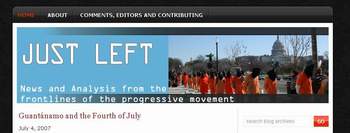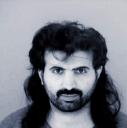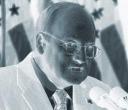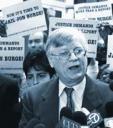Civil Liberties, Extraordinary Rendition, Guantanamo, Habeas Corpus, Human Rights, Targeting Muslims, Torture, Truth to Power
Podcast: Play in new window | Download


Laying the Foundation for a Police State – Part 1 – Building Blocks
Since July of 2004, Law and Disorder has brought Pacifica listeners the voices of activists, authors and attorneys from the front lines.
In the weeks to come, Law and Disorder hosts will examine in a four part series, the foundation for what many see as a police state in the United States. In this series they will talk with guests about the post 9/11 blueprint of this dictatorship/ police state and how the nefarious turn to war, the use of torture and the domestic propagation of fear unfolded.
Law and Disorder hosts have covered at length topics such as torture, domestic surveillance, criminalizing dissent, racial profiling, indefinite detentions and the destruction of constitutional rights as vital information to bring an understanding to listeners as to how it happened and where we go from here.
In this first series, the hosts begin with a look back at where they were on the day of September 11th, and how the Patriot Act was pushed through the Legislature immediately after the attacks on that day. They look at the racial profiling and roundup of Muslims and the rush to invade Afghanistan and Iraq using the Authorization for Use of Military Force.
Co-host Dalia Hashad describes her experiences as an attorney formerly with the ACLU right after September 11th as thousands of Muslim-Americans were rounded up or corralled because of their ethnicity or political affiliation.

Tracked in America – Samina Sundas
Samina Sundas with American Muslim Voice helped her fellow Muslims and Pakistani-Americans integrate into mainstream American society, and her role intensified after 9/11. When the National Security Entry-Exit Registration System (NSEERS, also known as the Special Registration program) was instituted in September 2002, Muslims all over the United States contacted her confused and worried about how it would affect them. She couldn’t get clear answers from federal immigration officials despite several meetings. After that, she set up an ad hoc hotline that has since become part of an organization called American Muslim Voice.



Framework of Police State laws since 9/11
Co-host Michael Ratner leads the way through the timeline from setting up the legal basis for a global war on terror to justifying a secret system of prisons and interrogation techniques that evade historic safeguards in the Geneva Convention.

Guest – Scott Horton, Chair of International Law Committee at the New York City Bar Association and adjunct Professor of Law at Columbia University. He is also the author of over 200 articles and monographs on legal developments in nations in transition.
—-
Law and Disorder Co-host Michael Ratner Launches Blog:Â Just Left

Civil Liberties, Extraordinary Rendition, Guantanamo, Habeas Corpus, Human Rights, Military Tribunal, Targeting Muslims, Torture, Truth to Power

Ali al-Marri Update: Reversing the Bush Administration’s War on Terror Policy
In a reversal of the Bush Administration’s effort to detain people around the globe, last week, a federal appeals court in Virginia, which is a very conservative court ruled that the government cannot subject Ali Saleh Kahlah al-Marri to indefinite detention, though he was subject to indefinite detention by a 2003 presidential order.


A legal US resident – though not a citizen – al-Marri had studied computer science at Bradley University in Peoria, Illinois in 1991, and returned on 10 September 2001 to pursue post-graduate studies, bringing his family – his wife and five children – with him. Three months later he was arrested and charged with fraud and making false statements to the FBI, but in June 2003, a month before he was due to stand trial for these charges in a federal court in Peoria, the prosecution dropped the charges and informed the court that he was to be held as an “enemy combatant†instead.
As some listeners may recall, here on Law and Disorder we’ve discussed Ali al-Marri’s case and how he was held incommunicado, indefinitely in a military prison without charges. He’s been in solitary confinement for more than 2 years, no access to reading material, except the Qur’an. According to his lawyers, he was constantly harassed, abused and any medical treatment he received was very poor.
Now, because the U.S. Court of Appeals for the 4th Circuit ruled that U.S. residents cannot be locked up indefinitely as “enemy combatants†without being charged, al-Marri can challenge his detention. Al-Marri is the only “enemy combatant” still in detention without charge in the United States itself.

Guest – Jonathan Hafetz, Litigation Director of the Brennan Center’s Liberty and National Security Project and the lead counsel for Al-Marri. He is the author of numerous articles in scholarly and popular publications, including the Yale Law Journal, California Western Law Review, and Fordham Journal of International Law, Legal Affairs, and the New York Law Journal.
——


Off the Record: U.S. Responsibility for Enforced Disappearances in the War on Terror
Children as young as seven years old detained in secret CIA prisons are some of the startling details unearthed by a recent report drafted by six human rights groups including Amnesty International (PDF file), the Center for Constitutional Rights and the Center for Human Rights and Global Justice at the New York University School of Law.
The report titled Off the Record: U.S. Responsibility for Enforced Disappearances in the War on Terror, details aspects of the CIA detention program that the US government has actively tried to conceal, such as the locations where prisoners may have been held, the mistreatment they endured, and the countries to which they may have been transferred. The report names 39 people believed to be disappeared from countries such as Egypt, Kenya, Libya, Morocco, Pakistan, and Spain.

Guest – Meg Satterthwaite, director of the Center for Human Rights and Global Justice at the (NYU) Law School. Satterthwaite has published reports and articles on human rights topics in scholarly and advocacy contexts. Her research interests include human rights in the “war on terrorâ€; gender, sexuality and human rights; and the human rights of migrants. She is Co-Chair of the International Human Rights Interest Group of the American Society of International Law, a member of the Board of Directors of Amnesty International USA, and a member of the International Law Committee of the City Bar of New York.
Podcast: Play in new window | Download
Civil Liberties, Extraordinary Rendition, Guantanamo, Prison Industry, Targeting Muslims, Torture, Truth to Power
Podcast: Play in new window | Download


Guantanamo Bay Detainee Dies : Alleged Suicide
Law and Disorder hosts Dalia Hashad, Michael Ratner and Michael Smith discuss the recent alleged suicide at Guantanamo Bay Prison in Cuba. The Saudi Arabian detainee died last Wednesday at Guantanamo Bay prison. The U.S. military says he apparently committed suicide.
“It’s conceivable he (the detainee) was murdered.” – – Michael Ratner, President of the Center for Constitutional Rights.
“This death demonstrates the urgent need to close Guantanamo Bay Prison.” – – Dalia Hashad, Amnesty International USA Program Director .
———————
Listen to the Pacifica National Special – The War on Immigrants – Co-hosted by our own Dalia Hashad.
———————

“War on Terror” Prisoners and Secret Detentions Update
Michael Ratner describes how the Bush Administration has been pushing coercive interrogations with limited resistance in Congress. He also points out the new laws that apply to prisoners in US military custody. Ratner says they are now required to obey the Army Field Manual on detainee treatment FM 34-52 that include almost 20 interrogation techniques that do not constitute torture. Those prisoners, alleged enemy combatants citizen or non-citizen in the custody of the CIA (secret prisons) are not subject to the Army Field Manual.

Anti-Torture Movement in Chicago Police Torture Case Gains Traction
The City Council will hold hearings on a special prosecutor’s “whitewash†report into police torture by former Chicago Police Lt. Jon Burge, thanks to a resolution co-signed today by 26 aldermen
The case includes a four-year investigation focused on allegations that 148 black men were tortured in Chicago police interrogation rooms in the 1970s and ’80s. The men say detectives under the command of Lt. Jon Burge beat them, used electric shocks, played mock Russian roulette and started to smother at least one to force confessions. Prosecutors described this type of criminal justice system where top officials in a position to put a stop to police torture appeared blind to the abuse. Among them, Mayor Richard Daley, when he served as Cook County state’s attorney.
Guest – Flint Taylor – Attorney with the People’s Law Office, leading the fight against covering up torture by the Chicago Police Department.
——————–

Overcoming Zionism: Creating a Single Democratic State in Israel/Palestine
Last month we heard author Joel Kovel discuss his book at the Brecht Forum. He recently joined Law and Disorder in the studio for a riveting interview that also looked into Kovel’s personal changes that led him to write Overcoming Zionism. Toward the end of the interview, co-host Dalia Hashad asks why Joel Kovel chose the word “overcoming” in his title.
“This book is absolutely fundamental for those who reject the unfortunate confusion between Jews, Judaism, Zionism and the State of Israel — a confusion which is the basis for systematic manipulation by the imperialist power system. It convincingly argues in favour of a single secular state for Israelis and Palestinians as the only democratic solution for the region.” Samir Amin, Director of the Third World Forum.

Guest – Joel Kovel author of Overcoming Zionism: Creating a Single Democratic State in Israel/Palestine, has been engaged in struggles for peace and justice since the Vietnam War era. He has worked within the antiwar and antinuclear movements, the solidarity movements in Central America and the Caribbean, the movements for democratic media, and, increasingly, for ecological transformation. He lived in Nicaragua for a period in 1986, and accompanied Pastors for Peace as they broke the US blockade on Cuba in their 1994 Friendshipment. He has acted in films, worked frequently with the Bread and Puppet theatre, and lectured on four continents. Kovel joined the Green Party since 1990. In 1998, he was the Green Party candidate for US Senator from New York, and in 2000 sought their Presidential nomination.
Civil Liberties, Death Penalty, Guantanamo, Habeas Corpus, Truth to Power
Podcast: Play in new window | Download


Habeas Corpus Update – Take Action
Co-hosts Michael Ratner and Dalia Hashad update listeners on recent decisions regarding Guantanamo prisoners and habeas corpus. Dalia Hashad alerts listeners to upcoming event supported by a coalition of civil liberties groups.

War Czar.
Michael Ratner and Dalia Hashad discuss the position of War Czar and what it means regarding the longevity of the wars in Iraq and Afghanistan. Why Did 3 Generals Refuse This Position?
——–




Demonstrators Worldwide Protest the Release of Luis Posada Carriles
In Canada, Mexico, Central and South America and across dozens of major cities in the United States, demonstrators worldwide took to the streets to protest the release of admitted former CIA operative, Luis Posada Carriles. He’s accused of being one of the masterminds of a l976 mid-air explosion that demolished a Cuban airliner, killing 73 people. Meanwhile the Cuban Five remain in prison. Look at photographic evidence here against Luis Posada Carriles / Washington Post Article – Free Ride For A Likely Killer
A message from Mumia Abu-Jamal : For over four decades, the US empire has been waging a secret and deadly war against Cuba. They have bombed fields, poisoned grain, hijacked planed, and plotted invasion. They have trained, paid and protected terrorists who have cost the lives of thousands of Cubans and virtually crippled their economy through a seemingly everlasting embargo. The Cuban Five, young men who tried to protect their people from these instances of U.S. state terrorism, who have bombed on one, nor planned to, who poisoned no one, nor planned to, who hurt non one, nor planned to, who merely reported the plotting of crimes against their people, face the full foul fury of the empire’s judiciary for trying to stop crimes. We must all, all of us protest the unjust convictions of Rene Gonzalez, Fernando Gonzalez, Antonio Guerrero, Gerardo Hernandez and Ramon Labanino.
We hear the voices of activists and lawyers speaking at the New York protest, including former US Attorney General Ramsey Clark and our own Heidi Boghosian.




Demonstraters Show Support For Mumia Abu-Jamal
Oral arguments were heard by 3 judges last week who will decide the fate of imprisoned former Black Panther and award winning journalist, Mumia Abu-Jamal at the Third Circuit Court of Appeals in Philadelphia. Abu-Jamal has been on death row for 25 years after being convicted of killing a police officer following a controversial trial before a predominantly-white jury. The Third Circuit Court heard oral arguments that will rule whether Abu-Jamal gets life in prison, a new trial or execution. Our own Heidi Boghosian was in the courts and the streets with the hundreds of demonstrators. We hear the voices of lawyers and activists Heidi interviewed on that day outside the Third Circuit Court in Philadelphia.
Hip Hop News Update / International Herald Tribune / Crime Scene Photos
Civil Liberties, Guantanamo, Military Tribunal, Supreme Court, Targeting Muslims, Torture, Truth to Power
Podcast: Play in new window | Download


Why Did Pulitzer Ignore Juan Gonzalez’s Reporting on Air Quality at Ground Zero?
Co-hosts Michael Ratner and Michael Smith commend the valuable investigative journalism by columnist and Democracy Now cohost, Juan Gonzalez. Gonzalez had written extensively about the air quality at Ground Zero after September 11th. Read more here. Here is an archive of Juan Gonzalez’s columns.
Co-hosts also discuss Supreme Court partial birth abortion ruling (PDF) and Michael Ratner‘s trip to Paris and the follow up on the case brought against former US Secretary of Defense Donald Rumsfeld in Germany.
—-


Drug Provision of the Higher Education Act
A coalition of groups including criminal justice, drug treatment, health organizations are seeking to repeal the Drug Provision of the Higher Education Act. It’s a 1998 law that delays or denies federal financial aid to people convicted of state or federal drug offenses. Since the law took effect in 2000, 200 thousand students have been denied financial aid. According to the Department of Education, that’s one in every 400 students rejected who apply for federal aid.
As a result, these young students, having already been punished for their offenses are now dropping out of school or reducing courses. Today, there are more than 300 organizations working to overturn this law.
Guest – David Borden, Executive Director of the Drug Reform Coordination Network. David’s been very active lately in lobbying to repeal the Drug Provision of the Higher Education Act (also known as the “Aid Elimination Penalty)
—-


Amnesty Report on Guantanamo Bay Prison Conditions
Earlier this month, Amnesty International released a report detailing the horrid prisoner conditions at Guantanamo Bay, Cuba. The report includes descriptions such as extreme isolation, sensory deprivation, solitary confinement 22 hours a day, and 24 hour lighting. Eighty per cent of the approximately 385 men currently held at Guantánamo are in isolation. Amnesty International also reports that the cells have no windows to the outside or access to natural light or fresh air.
Amnesty International is also calling on the government to allow independent health care professionals into Guantánamo to examine detainees in private and to allow visits by independent human right organizations and UN human rights experts.
Co-host and Amnesty International Director of the USA program, Dalia Hashad reads an excerpt from Bisher al-Rawi’s moving letter to free Guantanamo prisoners.
Guest – Shane Kadidal, an attorney with the Center for Constitutional Rights.
—-
Civil Liberties, Guantanamo, Military Tribunal, Surveillance, Torture, Truth to Power
Podcast: Play in new window | Download


Update:
- US Supreme Court Rejects Appeal (6-3 vote) From Guantanamo Detainees
- Co-hosts Michael Ratner and Michael Smith discuss the recent ruling by the Supreme Court to reject appeal from Guantanamo detainees who are challenging their five-year long confinement. Once again, Habeas Court is at stake. Michael Ratner says “If we had Habeas Corpus hearings, Guantanamo would be cleaned out in 24 hours.” Both co-hosts discuss what’s at stake as the US Supreme Court rolls back some 800 years, a fundamental pillar of justice. Habeas Corpus.
—-



Red Light For Stop Light Systems
Surveillance Creep: Across the United States, from Minnesota to Texas, a host of cities have installed automated systems to catch vehicles that run red lights. A photo is taken of the speeding car’s license plate and a citation is sent to the owner. Owners can contest it by showing that the car title had been transferred or by telling people the name of the person driving at the time. In Minneapolis, the police who manage the program said it issued 26,000 tickets in six months and reduced accidents by 16 percent at the intersections where cameras were posted.
But cities are finding problems with some of these devices. Lubbock, Texas for example has delayed installation of red light cameras after the discovery of shorter timed yellow lights. Also in Iowa. Residents felt this was an attempt to get more money…short yellows assure a steady flow of red light camera ticket revenue. And in Minneapolis, the program has reached its own red light. In mid-March the ACLU scored a victory in court, when a judge found the automated system, called Photo Cop, illegal. Photo Cop ticketed vehicle owners, not the drivers, which uniformity of Minnesota laws governing moving violations.
Guest – Howard Bass, a Burnsville attorney, he argued the case for the ACLU of Minnesota.
—-



Courts Relax Laws That Protect Expression of Free Speech From Police Spying
Unrestrained police surveillance has crept back into the lives of civilians at an alarming rate. Normally held in check by court settlements or consent decrees, city officials and courts are increasingly diluting the power of such agreements. A consent decree will help restrain overreaching law enforcement and permit the exercise of free speech.
In New York City, since 1986 police must follow consent decree guidelines when investigating individuals engaging in First Amendment activities. We may not have had these guidelines were it not for a lawsuit brought by Barbara Handschu Known as the Handschu Settlement, it was agreed to in 1980 by a plaintiff class numbering in the millions and the New York City Police Department.
Twenty-two years after the settlement was signed, the NYPD asked to modify it, saying it was too restrictive, and would inhibit terrorism investigation. U.S. District Court Judge Charles Haight agreed with the NYPD.and relaxed the guidelines.
And what’s happening in NY is also happening around the country.
Take Chicago for example. .In 2001 the 7th Circuit U.S. Court of Appeals stripped Chicago’s consent decree. It was signed 25 years ago. Now, city officials say it impedes investigations of gang activity. No longer are police deterred from spying on, or disrupting the constitutionally protected activities of political groups.
Historically, court settlements and consent decrees have held in check unfettered police abuse of First Amendment freedoms. But under the Bush administration, attorneys general have actually marginalized these important decrees. We’ve watched the Justice Department LIFT existing decrees, preferring to enter into less formal understandings with police. In so doing, the judicial branch of our government acts as a national conspirator with local police departments in violating our collective civil rights.
Guest – Paul Chevigny, law professor at New York University and one of the lawyers involved in NY’s historic Handschu lawsuit.
—-

























